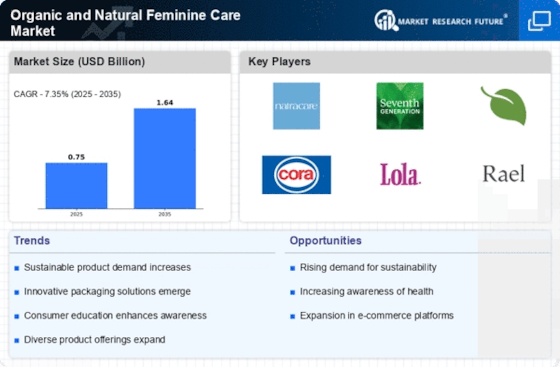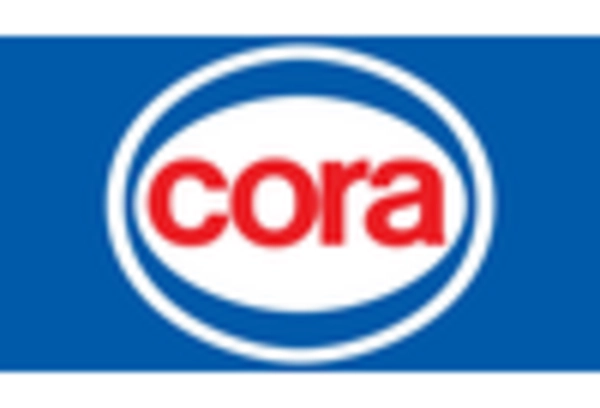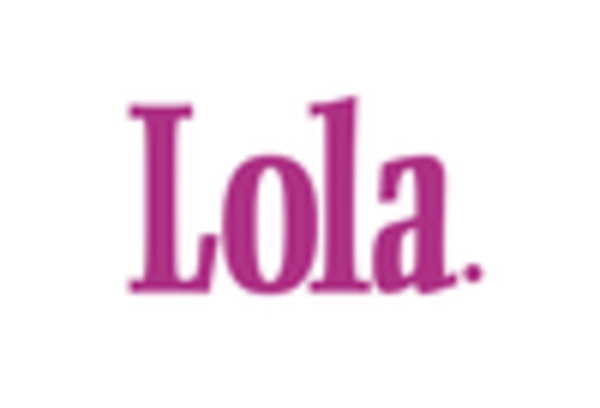-
Report Prologue\r\n \r\n2 Executive Summary\r\n \r\n3
-
Market Introduction\r\n3.1 Definition 18\r\n3.2 Scope of the
-
Study 18\r\n3.3 Research Objective 18\r\n3.4 Assumptions &
-
Limitations 18\r\n3.4.1 Assumptions 18\r\n3.4.2 Limitations
-
18\r\n3.5 Market Structure 19\r\n4 Research Methodology\r\n4.1
-
Research Process 21\r\n4.2 Primary Research 22\r\n4.3 Secondary
-
Research 23\r\n4.4 Market Size Estimation 24\r\n4.5 Forecast
-
Model 24\r\n5 Market Dynamics\r\n5.1 Introduction 26\r\n5.2
-
Drivers 27\r\n5.2.1 Rising demand and consumer interest towards organic
-
and natural menstrual products 27\r\n5.2.2 Risk of suffering from menstrual
-
toxic shock syndrome (TSS) 27\r\n5.2.3 Rising awareness and government
-
initiatives about organic and natural feminine care products 27\r\n5.2.4
-
Rise in product innovations 28\r\n5.3 Restraints 29\r\n5.3.1
-
High cost of products 29\r\n5.3.2 Non-availability of organic and natural
-
feminine care products in supermarkets or retail stores 29\r\n5.4 Opportunities
-
30\r\n5.4.1 Opportunity for big companies to enter in the organic and
-
natural feminine care market as small companies and start-ups dominate the market
-
30\r\n6 Market Factor Analysis\r\n6.1 Porter’s Five
-
Forces Model 32\r\n6.1.1 Bargaining Power of Suppliers 32\r\n6.1.2
-
Bargaining Power of Buyers 33\r\n6.1.3 Threat of New Entrants 33\r\n6.1.4
-
Threat of Substitutes 33\r\n6.1.5 Rivalry 33\r\n6.2 Supply
-
Chain Analysis 34\r\n6.2.1 R&D and Development 34\r\n6.2.2
-
Manufacturing 34\r\n6.2.3 Distribution & Sales 34\r\n6.2.4
-
Post-Sales Monitoring 35\r\n7 Organic and Natural Feminine Care Market,
-
by Product\r\n7.1 Introduction 37\r\n7.2 Sanitary Pads 38\r\n7.3
-
Tampons 39\r\n7.4 Panty Liners & Shields 40\r\n8 Organic
-
and Natural Feminine Care Market, by Distribution Channel\r\n8.1 Introduction
-
42\r\n8.2 Supermarkets & Hypermarkets 43\r\n8.3 Retail
-
Pharmacies 44\r\n8.4 Online Purchase 45\r\n9 Global Organic
-
and Natural Feminine Care Market, by Region\r\n9.1 Introduction 47\r\n9.2
-
Asia-Pacific 48\r\nOrganic and Natural Feminine Care Market, by Product\r\nOrganic
-
and Natural Feminine Care Market, by Distribution Channel\r\n9.2.1 China
-
51\r\nOrganic and Natural Feminine Care Market, by Product\r\nOrganic
-
and Natural Feminine Care Market, by Distribution Channel\r\n9.2.2 Japan
-
52\r\nOrganic and Natural Feminine Care Market, by Product\r\nOrganic
-
and Natural Feminine Care Market, by Distribution Channel\r\n9.2.3 India
-
53\r\nOrganic and Natural Feminine Care Market, by Product\r\nOrganic
-
and Natural Feminine Care Market, by Distribution Channel\r\n9.2.4 Australia
-
54\r\nOrganic and Natural Feminine Care Market, by Product\r\nOrganic
-
and Natural Feminine Care Market, by Distribution Channel\r\n9.2.5 South
-
Korea 55\r\nOrganic and Natural Feminine Care Market, by Product\r\nOrganic
-
and Natural Feminine Care Market, by Distribution Channel\r\n9.2.6 Rest
-
of Asia-Pacific 56\r\nOrganic and Natural Feminine Care Market, by Product\r\nOrganic
-
and Natural Feminine Care Market, by Distribution Channel\r\n9.3 Americas
-
57\r\nOrganic and Natural Feminine Care Market, by Product\r\nOrganic
-
and Natural Feminine Care Market, by Distribution Channel\r\n9.3.1 North
-
America 59\r\nOrganic and Natural Feminine Care Market, by Product\r\nOrganic
-
and Natural Feminine Care Market, by Distribution Channel\r\n9.3.1.1
-
US 60\r\nOrganic and Natural Feminine Care Market, by Product\r\nOrganic
-
and Natural Feminine Care Market, by Distribution Channel\r\n9.3.1.2
-
Canada 61\r\nOrganic and Natural Feminine Care Market, by Product\r\nOrganic
-
and Natural Feminine Care Market, by Distribution Channel\r\n9.3.2 South
-
America 62\r\nOrganic and Natural Feminine Care Market, by Product\r\nOrganic
-
and Natural Feminine Care Market, by Distribution Channel\r\n9.3.2.1
-
Brazil 64\r\nOrganic and Natural Feminine Care Market, by Product\r\nOrganic
-
and Natural Feminine Care Market, by Distribution Channel\r\n9.3.2.2
-
Rest of South America 65\r\nOrganic and Natural Feminine Care Market,
-
by Product\r\nOrganic and Natural Feminine Care Market, by Distribution
-
Channel\r\n9.4 Europe 66\r\nOrganic and Natural Feminine Care
-
Market, by Product\r\nOrganic and Natural Feminine Care Market, by Distribution
-
Channel\r\n9.4.1 Western Europe 68\r\nOrganic and Natural
-
Feminine Care Market, by Product\r\nOrganic and Natural Feminine Care
-
Market, by Distribution Channel\r\n9.4.1.1 Germany 70\r\nOrganic
-
and Natural Feminine Care Market, by Product\r\nOrganic and Natural Feminine
-
Care Market, by Distribution Channel\r\n9.4.1.2 France 71\r\nOrganic
-
and Natural Feminine Care Market, by Product\r\nOrganic and Natural Feminine
-
Care Market, by Distribution Channel\r\n9.4.1.3 UK 72\r\nOrganic
-
and Natural Feminine Care Market, by Product\r\nOrganic and Natural Feminine
-
Care Market, by Distribution Channel\r\n9.4.1.4 Italy 73\r\nOrganic
-
and Natural Feminine Care Market, by Product\r\nOrganic and Natural Feminine
-
Care Market, by Distribution Channel\r\n9.4.1.5 Spain 74\r\nOrganic
-
and Natural Feminine Care Market, by Product\r\nOrganic and Natural Feminine
-
Care Market, by Distribution Channel\r\n9.4.1.6 Rest of Western Europe
-
75\r\nOrganic and Natural Feminine Care Market, by Product\r\nOrganic
-
and Natural Feminine Care Market, by Distribution Channel\r\n9.4.2 Eastern
-
Europe 76\r\nOrganic and Natural Feminine Care Market, by Product\r\nOrganic
-
and Natural Feminine Care Market, by Distribution Channel\r\n9.5 Middle
-
East & Africa 77\r\nOrganic and Natural Feminine Care Market, by
-
Product\r\nOrganic and Natural Feminine Care Market, by Distribution
-
Channel\r\n9.5.1 Middle East 79\r\nOrganic and Natural Feminine
-
Care Market, by Product\r\nOrganic and Natural Feminine Care Market,
-
by Distribution Channel\r\n9.5.2 Africa 80\r\nOrganic and
-
Natural Feminine Care Market, by Product\r\nOrganic and Natural Feminine
-
Care Market, by Distribution Channel\r\n10 Competitive Landscape\r\n10.1
-
Introduction 82\r\n10.2 Company Ranking 82\r\n11 Company Profiles\r\n11.1
-
Procter & Gamble 84\r\n11.1.1 Company Overview 84\r\n11.1.2
-
Financial Overview 84\r\n11.1.3 Products/Services Offered 85\r\n11.1.4
-
SWOT Analysis 85\r\n11.1.5 Key Development 85\r\n11.1.6 Key
-
Strategies 85\r\n11.2 Armada & Lady Anion 86\r\n11.2.1
-
Company Overview 86\r\n11.2.2 Financial Overview 86\r\n11.2.3
-
Products/Services Offered 86\r\n11.2.4 SWOT Analysis 86\r\n11.2.5
-
Key Development 86\r\n11.2.6 Key Strategies 86\r\n11.3 Bodywise
-
(UK) Limited 87\r\n11.3.1 Company Overview 87\r\n11.3.2 Financial
-
Overview 87\r\n11.3.3 Products/Services Offered 87\r\n11.3.4
-
SWOT Analysis 88\r\n11.3.5 Key Developments 88\r\n11.3.6 Key
-
strategy 88\r\n11.4 Corman USA Inc. 89\r\n11.4.1 Company Overview
-
89\r\n11.4.2 Financial Overview 89\r\n11.4.3 Products/Services
-
Offered 89\r\n11.4.4 SWOT Analysis 90\r\n11.4.5 Key Developments
-
90\r\n11.4.6 Key strategy 90\r\n11.5 GladRags 91\r\n11.5.1
-
Company Overview 91\r\n11.5.2 Financial Overview 91\r\n11.5.3
-
Products/Services Offered 91\r\n11.5.4 SWOT Analysis 92\r\n11.5.5
-
Key Developments 92\r\n11.5.6 Key Strategy 92\r\n11.6 Heyday
-
Care LLP 93\r\n11.6.1 Company Overview 93\r\n11.6.2 Financial
-
Overview 93\r\n11.6.3 Products/Services Offered 93\r\n11.6.4
-
SWOT Analysis 93\r\n11.6.5 Key Developments 93\r\n11.6.6 Key
-
Strategy 93\r\n11.7 Maxim Hygiene 94\r\n11.7.1 Company Overview
-
94\r\n11.7.2 Financial Overview 94\r\n11.7.3 Products/Services
-
Offered 94\r\n11.7.4 SWOT Analysis 95\r\n11.7.5 Key Development
-
95\r\n11.7.6 Key Strategy 95\r\n11.8 Apropos 96\r\n11.8.1
-
Company Overview 96\r\n11.8.2 Financial Overview 96\r\n11.8.3
-
Products/Services Offered 96\r\n11.8.4 SWOT Analysis 96\r\n11.8.5
-
Key Development 96\r\n11.8.6 Key Strategy 97\r\n11.9 Purganics
-
98\r\n11.9.1 Company Overview 98\r\n11.9.2 Financial Overview
-
98\r\n11.9.3 Products/Services Offered 98\r\n11.9.4 SWOT Analysis
-
98\r\n11.9.5 Key Development 98\r\n11.9.6 Key Strategy 98\r\n11.10
-
Rael 99\r\n11.10.1 Company Overview 99\r\n11.10.2 Financial
-
Overview 99\r\n11.10.3 Products/Services Offered 99\r\n11.10.4
-
SWOT Analysis 100\r\n11.10.5 Key Development 100\r\n11.10.6
-
Key Strategy 100\r\n11.11 Saathi 101\r\n11.11.1 Company Overview
-
101\r\n11.11.2 Financial Overview 101\r\n11.11.3 Products/Services
-
Offered 101\r\n11.11.4 SWOT Analysis 101\r\n11.11.5 Key Development
-
101\r\n11.11.6 Key Strategy 101\r\n11.12 The Honest Company
-
Inc. 102\r\n11.12.1 Company Overview 102\r\n11.12.2 Financial
-
Overview 102\r\n11.12.3 Products/Services Offered 102\r\n11.12.4
-
SWOT Analysis 102\r\n11.12.5 Key Development 102\r\n11.12.6
-
Key Strategy 103\r\n11.13 Tosama 104\r\n11.13.1 Company Overview
-
104\r\n11.13.2 Financial Overview 104\r\n11.13.3 Products/Services
-
Offered 104\r\n11.13.4 SWOT Analysis 105\r\n11.13.5 Key Development
-
105\r\n11.13.6 Key Strategy 105\r\n11.14 Veeda USA 106\r\n11.14.1
-
Company Overview 106\r\n11.14.2 Financial Overview 106\r\n11.14.3
-
Products/Services Offered 106\r\n11.14.4 SWOT Analysis 106\r\n11.14.5
-
Key Development 106\r\n11.14.6 Key Strategy 106\r\n11.15 Other
-
Companies List 107\r\n12 Appendix\r\n12.1 Discussion Blue
-
Print 109\r\n \r\n13 List of Tables\r\nTABLE
-
MARKET SYNOPSIS 16\r\nTABLE 2 PRIMARY INTERVIEWS 21\r\nTABLE
-
GLOBAL ORGANIC AND NATURAL FEMININE CARE MARKET, BY PRODUCT, 2024–2032 (USD
-
Billion) 38\r\nTABLE 4 GLOBAL ORGANIC AND NATURAL FEMININE CARE MARKET
-
FOR SANITARY PADS, BY REGION, 2024–2032 (USD Billion) 38\r\nTABLE
-
GLOBAL ORGANIC AND NATURAL FEMININE CARE MARKET FOR TAMPONS, BY REGION, 2024–2032
-
(USD Billion) 39\r\nTABLE 6 GLOBAL ORGANIC AND NATURAL FEMININE CARE
-
MARKET FOR PANTY LINERS & SHIELDS, BY REGION,\r\n2024–2032
-
(USD Billion) 40\r\nTABLE 7 GLOBAL ORGANIC AND NATURAL FEMININE CARE
-
MARKET, BY DISTRIBUTION CHANNEL, 2024–2032 (USD Billion) 43\r\nTABLE
-
GLOBAL ORGANIC AND NATURAL FEMININE CARE MARKET FOR SUPERMARKETS & HYPERMARKETS,
-
BY REGION,\r\n2024–2032 (USD Billion) 43\r\nTABLE 9
-
GLOBAL ORGANIC AND NATURAL FEMININE CARE MARKET FOR RETAIL PHARMACIES, BY REGION,
-
FEMININE CARE MARKET FOR ONLINE PURCHASE, BY REGION, 2024–2032 (USD Billion)
-
45\r\nTABLE 11 GLOBAL ORGANIC AND NATURAL FEMININE CARE MARKET, BY REGION,
-
NATURAL FEMININE CARE MARKET, BY COUNTRY, 2024–2032 (USD Billion) 49\r\nTABLE
-
ASIA-PACIFIC: ORGANIC AND NATURAL FEMININE CARE MARKET, BY PRODUCT, 2024–2032
-
(USD Billion) 50\r\nTABLE 14 ASIA-PACIFIC: ORGANIC AND NATURAL FEMININE
-
CARE MARKET, BY DISTRIBUTION CHANNEL, 2024–2032 (USD Billion) 50\r\nTABLE
-
CHINA: ORGANIC AND NATURAL FEMININE CARE MARKET, BY PRODUCT, 2024–2032
-
(USD Billion) 51\r\nTABLE 16 CHINA: ORGANIC AND NATURAL FEMININE CARE
-
MARKET, BY DISTRIBUTION CHANNEL, 2024–2032 (USD Billion) 51\r\nTABLE
-
JAPAN: ORGANIC AND NATURAL FEMININE CARE MARKET, BY PRODUCT, 2024–2032
-
(USD Billion) 52\r\nTABLE 18 JAPAN: ORGANIC AND NATURAL FEMININE CARE
-
MARKET, BY DISTRIBUTION CHANNEL, 2024–2032 (USD Billion) 52\r\nTABLE
-
INDIA: ORGANIC AND NATURAL FEMININE CARE MARKET, BY PRODUCT, 2024–2032
-
(USD Billion) 53\r\nTABLE 20 INDIA: ORGANIC AND NATURAL FEMININE CARE
-
MARKET, BY DISTRIBUTION CHANNEL, 2024–2032 (USD Billion) 53\r\nTABLE
-
AUSTRALIA: ORGANIC AND NATURAL FEMININE CARE MARKET, BY PRODUCT, 2024–2032
-
(USD Billion) 54\r\nTABLE 22 AUSTRALIA: ORGANIC AND NATURAL FEMININE
-
CARE MARKET, BY DISTRIBUTION CHANNEL, 2024–2032 (USD Billion) 54\r\nTABLE
-
SOUTH KOREA: ORGANIC AND NATURAL FEMININE CARE MARKET, BY PRODUCT, 2024–2032
-
(USD Billion) 55\r\nTABLE 24 SOUTH KOREA: ORGANIC AND NATURAL FEMININE
-
CARE MARKET, BY DISTRIBUTION CHANNEL, 2024–2032 (USD Billion) 55\r\nTABLE
-
REST OF ASIA-PACIFIC: ORGANIC AND NATURAL FEMININE CARE MARKET, BY PRODUCT, 2024–2032
-
(USD Billion) 56\r\nTABLE 26 REST OF ASIA-PACIFIC: ORGANIC AND NATURAL
-
FEMININE CARE MARKET, BY DISTRIBUTION CHANNEL,\r\n2024–2032 (USD
-
Billion) 56\r\nTABLE 27 AMERICAS: ORGANIC AND NATURAL FEMININE CARE MARKET,
-
BY REGION, 2024–2032 (USD Billion) 57\r\nTABLE 28 AMERICAS: ORGANIC
-
AND NATURAL FEMININE CARE MARKET, BY PRODUCT, 2024–2032 (USD Billion) 58\r\nTABLE
-
AMERICAS: ORGANIC AND NATURAL FEMININE CARE MARKET, BY DISTRIBUTION CHANNEL,
-
NATURAL FEMININE CARE MARKET, BY COUNTRY, 2024–2032 (USD Billion) 59\r\nTABLE
-
NORTH AMERICA: ORGANIC AND NATURAL FEMININE CARE MARKET, BY PRODUCT, 2024–2032
-
(USD Billion) 59\r\nTABLE 32 NORTH AMERICA: ORGANIC AND NATURAL FEMININE
-
CARE MARKET, BY DISTRIBUTION CHANNEL, 2024–2032 (USD Billion) 60\r\nTABLE
-
US: ORGANIC AND NATURAL FEMININE CARE MARKET, BY PRODUCT, 2024–2032 (USD
-
Billion) 60\r\nTABLE 34 US: ORGANIC AND NATURAL FEMININE CARE MARKET,
-
BY DISTRIBUTION CHANNEL, 2024–2032 (USD Billion) 61\r\nTABLE 35
-
CANADA: ORGANIC AND NATURAL FEMININE CARE MARKET, BY PRODUCT, 2024–2032 (USD
-
Billion) 61\r\nTABLE 36 CANADA: ORGANIC AND NATURAL FEMININE CARE MARKET,
-
BY DISTRIBUTION CHANNEL, 2024–2032 (USD Billion) 62\r\nTABLE 37
-
SOUTH AMERICA: ORGANIC AND NATURAL FEMININE CARE MARKET, BY COUNTRY/REGION, 2024–2032
-
(USD Billion) 62\r\nTABLE 38 SOUTH AMERICA: ORGANIC AND NATURAL FEMININE
-
CARE MARKET, BY PRODUCT, 2024–2032 (USD Billion) 63\r\nTABLE 39
-
SOUTH AMERICA: ORGANIC AND NATURAL FEMININE CARE MARKET, BY DISTRIBUTION CHANNEL,
-
FEMININE CARE MARKET, BY PRODUCT, 2024–2032 (USD Billion) 64\r\nTABLE
-
BRAZIL: ORGANIC AND NATURAL FEMININE CARE MARKET, BY DISTRIBUTION CHANNEL, 2024–2032
-
(USD Billion) 64\r\nTABLE 42 REST OF SOUTH AMERICA: ORGANIC AND NATURAL
-
FEMININE CARE MARKET, BY PRODUCT, 2024–2032 (USD Billion) 65\r\nTABLE
-
REST OF SOUTH AMERICA: ORGANIC AND NATURAL FEMININE CARE MARKET, BY DISTRIBUTION
-
CHANNEL,\r\n2024–2032 (USD Billion) 65\r\nTABLE 44 EUROPE:
-
ORGANIC AND NATURAL FEMININE CARE MARKET, BY REGION, 2024–2032 (USD Billion)
-
66\r\nTABLE 45 EUROPE: ORGANIC AND NATURAL FEMININE CARE MARKET, BY PRODUCT,
-
FEMININE CARE MARKET, BY DISTRIBUTION CHANNEL, 2024–2032 (USD Billion) 67\r\nTABLE
-
WESTERN EUROPE: ORGANIC AND NATURAL FEMININE CARE MARKET, BY COUNTRY, 2024–2032
-
(USD Billion) 68\r\nTABLE 48 WESTERN EUROPE: ORGANIC AND NATURAL FEMININE
-
CARE MARKET, BY PRODUCT, 2024–2032 (USD Billion) 69\r\nTABLE 49
-
WESTERN EUROPE: ORGANIC AND NATURAL FEMININE CARE MARKET, BY DISTRIBUTION CHANNEL,
-
FEMININE CARE MARKET, BY PRODUCT, 2024–2032 (USD Billion) 70\r\nTABLE
-
GERMANY: ORGANIC AND NATURAL FEMININE CARE MARKET, BY DISTRIBUTION CHANNEL, 2024–2032
-
(USD Billion) 70\r\nTABLE 52 FRANCE: ORGANIC AND NATURAL FEMININE CARE
-
MARKET, BY PRODUCT, 2024–2032 (USD Billion) 71\r\nTABLE 53 FRANCE:
-
ORGANIC AND NATURAL FEMININE CARE MARKET, BY DISTRIBUTION CHANNEL, 2024–2032
-
(USD Billion) 71\r\nTABLE 54 UK: ORGANIC AND NATURAL FEMININE CARE MARKET,
-
BY PRODUCT, 2024–2032 (USD Billion) 72\r\nTABLE 55 UK: ORGANIC
-
AND NATURAL FEMININE CARE MARKET, BY DISTRIBUTION CHANNEL, 2024–2032 (USD
-
Billion) 72\r\nTABLE 56 ITALY: ORGANIC AND NATURAL FEMININE CARE MARKET,
-
BY PRODUCT, 2024–2032 (USD Billion) 73\r\nTABLE 57 ITALY: ORGANIC
-
AND NATURAL FEMININE CARE MARKET, BY DISTRIBUTION CHANNEL, 2024–2032 (USD
-
Billion) 73\r\nTABLE 58 SPAIN: ORGANIC AND NATURAL FEMININE CARE MARKET,
-
BY PRODUCT, 2024–2032 (USD Billion) 74\r\nTABLE 59 SPAIN: ORGANIC
-
AND NATURAL FEMININE CARE MARKET, BY DISTRIBUTION CHANNEL, 2024–2032 (USD
-
Billion) 74\r\nTABLE 60 REST OF WESTERN EUROPE: ORGANIC AND NATURAL FEMININE
-
CARE MARKET, BY PRODUCT, 2024–2032 (USD Billion) 75\r\nTABLE 61
-
REST OF WESTERN EUROPE: ORGANIC AND NATURAL FEMININE CARE MARKET, BY DISTRIBUTION
-
CHANNEL,\r\n2024–2032 (USD Billion) 75\r\nTABLE 62 EASTERN
-
EUROPE: ORGANIC AND NATURAL FEMININE CARE MARKET, BY PRODUCT, 2024–2032 (USD
-
Billion) 76\r\nTABLE 63 EASTERN EUROPE: ORGANIC AND NATURAL FEMININE
-
CARE MARKET, BY DISTRIBUTION CHANNEL, 2024–2032 (USD Billion) 76\r\nTABLE
-
MIDDLE EAST & AFRICA: ORGANIC AND NATURAL FEMININE CARE MARKET, BY REGION,
-
ORGANIC AND NATURAL FEMININE CARE MARKET, BY PRODUCT, 2024–2032 (USD Billion)
-
78\r\nTABLE 66 MIDDLE EAST & AFRICA: ORGANIC AND NATURAL FEMININE
-
CARE MARKET, BY DISTRIBUTION CHANNEL,\r\n2024–2032 (USD Billion)
-
78\r\nTABLE 67 MIDDLE EAST: ORGANIC AND NATURAL FEMININE CARE MARKET,
-
BY PRODUCT, 2024–2032 (USD Billion) 79\r\nTABLE 68 MIDDLE EAST:
-
ORGANIC AND NATURAL FEMININE CARE MARKET, BY DISTRIBUTION CHANNEL, 2024–2032
-
(USD Billion) 79\r\nTABLE 69 AFRICA: ORGANIC AND NATURAL FEMININE CARE
-
MARKET, BY PRODUCT, 2024–2032 (USD Billion) 80\r\nTABLE 70 AFRICA:
-
ORGANIC AND NATURAL FEMININE CARE MARKET, BY DISTRIBUTION CHANNEL, 2024–2032
-
(USD Billion) 80\r\n \r\n \r\n14 List
-
of Figures\r\nFIGURE 1 GLOBAL ORGANIC AND NATURAL FEMININE CARE MARKET:
-
MARKET STRUCTURE 19\r\nFIGURE 2 RESEARCH PROCESS 21\r\nFIGURE
-
TOP-DOWN & BOTTOM-UP APPROACH 24\r\nFIGURE 4 MARKET DYNAMICS ANALYSIS
-
OF THE GLOBAL ORGANIC AND NATURAL FEMININE CARE MARKET 26\r\nFIGURE 5
-
PORTER’S FIVE FORCES ANALYSIS: GLOBAL ORGANIC AND NATURAL FEMININE CARE MARKET
-
32\r\nFIGURE 6 SUPPLY CHAIN: GLOBAL ORGANIC AND NATURAL FEMININE CARE
-
MARKET 34\r\nFIGURE 7 GLOBAL ORGANIC AND NATURAL FEMININE CARE MARKET
-
SHARE, BY PRODUCT, 2023(%) 37\r\nFIGURE 8 GLOBAL ORGANIC AND NATURAL
-
FEMININE CARE MARKET, BY PRODUCT, 2024 & 2032 (USD Billion) 37\r\nFIGURE
-
GLOBAL ORGANIC AND NATURAL FEMININE CARE MARKET SHARE, BY DISTRIBUTION CHANNEL,
-
BY DISTRIBUTION CHANNEL, 2024 & 2032 (USD Billion) 42\r\nFIGURE 11
-
GLOBAL ORGANIC AND NATURAL FEMININE CARE MARKET SHARE, BY REGION, 2023(%) 47\r\nFIGURE
-
GLOBAL ORGANIC AND NATURAL FEMININE CARE MARKET, BY REGION, 2024 & 2032 (USD
-
Billion) 47\r\nFIGURE 13 ASIA-PACIFIC: ORGANIC AND NATURAL FEMININE CARE
-
MARKET SHARE, BY COUNTRY, 2023 (%) 49\r\nFIGURE 14 AMERICAS: ORGANIC
-
AND NATURAL FEMININE CARE MARKET SHARE, BY REGION, 2023 (%) 57\r\nFIGURE
-
NORTH AMERICA: ORGANIC AND NATURAL FEMININE CARE MARKET SHARE, BY COUNTRY, 2023
-
(%) 59\r\nFIGURE 16 EUROPE: ORGANIC AND NATURAL FEMININE CARE MARKET
-
SHARE, BY REGION, 2023 (%) 66\r\nFIGURE 17 WESTERN EUROPE: ORGANIC AND
-
NATURAL FEMININE CARE MARKET SHARE, BY COUNTRY, 2023 (%) 68\r\nFIGURE
-
MIDDLE EAST & AFRICA: ORGANIC AND NATURAL FEMININE CARE MARKET SHARE, BY
-
REGION, 2023 (%) 77









Leave a Comment